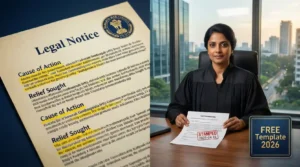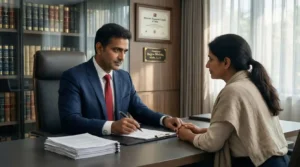Introduction
In the bustling metropolis of Bengaluru, where legal matters arise as frequently as tech startups, navigating the judicial system can feel like traversing a complex maze.
Understanding which court possesses the authority, or jurisdiction, to hear your case is the crucial first step towards seeking justice. Misfiling a case not only leads to frustrating delays and wasted resources but can also jeopardize your legal rights.
At SP Law Chambers, a leading provider of Legal services in Bengaluru, we understand the confusion that often surrounds the hierarchy and jurisdiction of courts in our city.
With over six years of experience in crafting legal content that resonates and ranks, we aim to demystify the roles of the High Court of Karnataka and the Bangalore District Courts.
This comprehensive guide will provide you with clarity on when to approach each court, their respective powers, and how to make informed decisions about your legal journey.
Read More: How to File Civil Suit in Bangalore: Step‑by‑Step Guide 2026
Hierarchy of Courts in Bangalore
The judicial system in Bengaluru, like the rest of India, follows a hierarchical structure. This means that lower courts are subordinate to higher courts, and decisions made by lower courts can often be appealed to higher ones.
Understanding this hierarchy is essential to know where your case fits in the broader legal landscape. The basic structure in Bengaluru is as follows:
- Village Courts (Nyaya Panchayats): While not always active in urban centers like Bengaluru, these form the base of the judicial pyramid, dealing with minor disputes at the local level.
- Magistrate Courts and Munsiff Courts: These are the primary trial courts at the Taluk level within the Bangalore Urban district, handling criminal cases of lower severity and civil suits of smaller pecuniary value.
- Bangalore District Courts: Situated at the district level, these courts have broader jurisdiction over both civil and criminal matters within Bangalore. They also act as appellate courts for some decisions of the lower courts.
- High Court of Karnataka: Located in Bengaluru, the High Court is the apex judicial body in the state. It has original jurisdiction in certain matters and appellate jurisdiction over the decisions of the District Courts and other subordinate courts in Karnataka.
- Supreme Court of India: At the pinnacle of the Indian judicial system, the Supreme Court in New Delhi is the final court of appeal for all cases arising within the country, including those from the High Court of Karnataka.
This article will primarily focus on the distinction between the Bangalore District Courts and the High Court of Karnataka, as these are the forums where most significant legal battles in the city are fought.
High Court of Karnataka: Jurisdiction and Case Types
The High Court of Karnataka stands as a pillar of justice in the state, wielding significant judicial authority. Understanding its jurisdiction is crucial for determining if your case falls within its purview.
Jurisdiction of Bangalore High Court
The Jurisdiction of Bangalore High Court is multifaceted and can be broadly categorized as follows:
Original Jurisdiction
In certain specific matters, the High Court has the power to hear cases for the first time. This includes:
- Writ Petitions: Under Articles 226 and 227 of the Constitution of India, the High Court can issue writs (such as Habeas Corpus, Mandamus, Prohibition, Certiorari, and Quo Warranto) to enforce fundamental rights or for any other purpose. These are often filed against the government or other public authorities. For instance, if your fundamental rights are violated by a state action in Electronic City or Whitefield, you might approach the High Court directly.
- Company Matters: Cases related to the winding up of companies, disputes between shareholders, and other company law issues often fall under the original jurisdiction of the High Court.
- Admiralty Cases: Disputes related to shipping and maritime law are typically heard by the High Court.
- Election Petitions: Challenges to the election of Members of Parliament and Members of the Legislative Assembly are often filed directly in the High Court.
- Public Interest Litigation (PIL): Matters of public interest concerning issues affecting a large section of society can be brought before the High Court.
Appellate Jurisdiction
A significant part of the High Court’s work involves hearing appeals against the decisions of subordinate courts, including the Bangalore District Courts. This means that if you are dissatisfied with the judgment of a District Court in a civil case in JP Nagar or a criminal case in HSR Layout, you can file an appeal in the High Court. The High Court re-examines the law and facts of the case to determine if the lower court’s decision was correct.
Supervisory Jurisdiction
The High Court has the power of superintendence over all subordinate courts and tribunals within its territorial jurisdiction. This includes the power to call for records, issue directions, and ensure the proper administration of justice by the lower courts.
When Should You Approach the High Court?
Knowing when to approach High Court is vital. Generally, you should consider approaching the High Court in the following situations:
Enforcement of Fundamental Rights
If you believe your fundamental rights have been violated by the state or any public authority, filing a writ petition in the High Court is the appropriate course of action. For example, if you face illegal detention in Indiranagar, a Habeas Corpus petition would be filed in the High Court.
Significant Company Law Matters
Issues like company mergers, demergers, or insolvency proceedings that have substantial financial implications are usually dealt with by the High Court.
Appeals from District Court Decisions
If you have lost a case in the District Court and believe there was an error in the judgment, you can file an appeal in the High Court. This applies to both civil and criminal cases. For instance, if a civil suit concerning property in Koramangala is decided against you in the District Court, you can appeal to the High Court.
Public Interest Litigation
If you are concerned about a matter of public importance that affects a large number of people, you can file a PIL in the High Court seeking redressal.
Cases Involving Substantial Questions of Law
If a case involves complex legal interpretations or challenges to the validity of a law, it may be directly filed in the High Court or transferred to it from a lower court.
Recent Trends in High Court Case Disposal (2024 Data)
Based on available data up to 2024, the High Court of Karnataka has been actively working to improve its case disposal rate. Several initiatives, including the adoption of technology for case management and the prioritization of older cases, have contributed to a gradual reduction in pendency. However, like many High Courts across the country, a significant backlog of cases persists.
In 2024, there was a noticeable increase in the disposal of writ petitions, particularly those related to service matters and land acquisition. The High Court has also focused on expediting criminal appeals, some of which have been pending for several years. While the exact figures fluctuate, the trend indicates a commitment to efficiency, though the sheer volume of litigation in a growing city like Bengaluru continues to pose a challenge. These efforts are crucial for ensuring timely justice for litigants across South Bangalore and other parts of the city.
Jurisdiction of Bangalore District Courts
The jurisdiction of Bangalore District Courts is primarily as follows:
Original Civil Jurisdiction
The District Courts have the authority to hear most civil suits that do not fall under the specific original jurisdiction of the High Court. This includes cases related to:
- Property disputes (e.g., ownership, partition, eviction) in areas like JP Nagar and Koramangala.
- Contractual breaches.
- Recovery of money.
- Matrimonial disputes (handled by separate Family Courts within the District Court complex).
- Injunctions and specific performance of contracts.
The pecuniary jurisdiction (the monetary value of the suit) for District Courts is generally higher than that of the subordinate civil courts (like Munsiff Courts).
Original Criminal Jurisdiction
he District Courts, specifically the Sessions Courts within the same complex, handle major criminal offences, including:
- Murder.
- Attempt to murder.
- Rape.
- Kidnapping.
- Serious economic offences.
The Sessions Judge has the power to impose the death penalty, although such sentences are subject to confirmation by the High Court.
If you are facing serious criminal charges in Electronic City or Whitefield, your case will likely be heard in the Sessions Court.
Appellate Jurisdiction
The District Courts also act as the first appellate court for decisions of the subordinate civil and criminal courts within the district.
For example, if you lose a case in a Munsiff Court regarding a minor property dispute in HSR Layout, you can appeal to the District Court.
When to Approach the District Court?
Understanding when to approach District Court is essential for initiating your legal proceedings correctly. Generally, you should approach the District Court in the following scenarios:
- Most Civil Disputes: If you have a civil dispute concerning property, contracts, recovery of money, or other such matters where the pecuniary value falls within the District Court’s limits, you should file your suit there. For instance, a dispute over ancestral property in South Bangalore would typically be filed in the District Court.
- Major Criminal Offences: If you are accused of a serious criminal offence, your trial will be conducted in the Sessions Court (part of the District Court system). Similarly, victims of such crimes would also approach the District Court for legal recourse. If you need an Anticipatory Bail lawyer in Bangalore, they would typically file the application in the Sessions Court.
- Appeals from Lower Courts: If you are dissatisfied with the decision of a Magistrate Court or a Munsiff Court, you can file your first appeal in the District Court.
- Family Matters: While often housed in separate Family Courts within the District Court complex, cases related to divorce (Divorce lawyer in Bangalore), child custody, maintenance, and other family law issues are initiated here. Our team at SP Law Chambers includes experienced Family Court lawyers in Bangalore who can assist you with these sensitive matters in areas like Indiranagar and beyond.
District Courts’ Case Backlog and Efficiency (2024 Insights)
In 2024, the Bangalore District Courts continued to grapple with a significant backlog of cases. The sheer volume of litigation, coupled with infrastructure limitations and staffing shortages, contributes to this challenge. However, efforts are underway to improve efficiency.
These include the implementation of e-filing systems, the establishment of special courts for specific types of cases (e.g., cheque bounce cases), and regular Lok Adalats (alternative dispute resolution mechanisms) to reduce the burden on the regular courts.
Insights from 2024 suggest that while the disposal rate has seen marginal improvements, the overall pendency remains high.
Certain types of cases, such as land acquisition disputes and long-standing civil suits, contribute significantly to the backlog.
The judiciary is actively exploring measures to expedite these cases, recognizing the impact of delays on the lives of litigants in areas like Electronic City and Whitefield.
If you require assistance with District Courts Cases lawyer in Bangalore, it’s crucial to choose a firm like SP Law Chambers that is adept at navigating these challenges.
Expert Insights: Quotes from SP Law Chambers’ Legal Team
At SP Law Chambers, our team of seasoned legal professionals possesses extensive experience in handling cases across the judicial spectrum in Bengaluru.
Here are some insights from our experts:
“Understanding the nuances of jurisdiction between the High Court and the District Courts is paramount for effective legal strategy. Filing in the wrong court not only delays justice but can also weaken your case. Our team at SP Law Chambers ensures that your matter is presented before the appropriate forum from the outset.” – Mr. S. Prakash, Managing Partner, SP Law Chambers.
“Writ jurisdiction under the High Court is a powerful tool for safeguarding fundamental rights. However, it’s crucial to have a clear understanding of the grounds for filing a writ petition. Our High Court Lawyer in Bangalore team has a proven track record of successfully handling such matters.” – Ms. Anita Sharma, Senior Advocate, SP Law Chambers.
“District Courts are the workhorses of our judicial system, handling a vast majority of civil and criminal cases. Navigating the procedures and managing the backlog requires experienced counsel. Our District Courts Cases lawyer in Bangalore are adept at providing effective representation at this level.” – Mr. Ravi Kumar, Advocate, SP Law Chambers.
“Family law matters require a sensitive and understanding approach. The Family Courts within the District Court system provide a specialized forum for these cases. Our Family Court lawyers in Bangalore offer compassionate and effective legal support.” – Ms. Priya Verma, Advocate, SP Law Chambers.
These insights underscore the importance of choosing the right legal expertise to navigate the complexities of the Bangalore judicial system.
People Also Ask: 8 FAQs About Bangalore Courts
What is the difference between a civil case and a criminal case?
Civil cases involve disputes between individuals or entities, seeking remedies like compensation or specific actions. Criminal cases involve actions considered harmful to society, prosecuted by the state, and can result in penalties like fines or imprisonment. Our lawyers specializing in Civil cases lawyer in Bangalore and Criminal Law in Bangalore can provide specific guidance.
How do I find out which court has jurisdiction over my case in Bengaluru?
The jurisdiction depends on the nature of the case (civil or criminal), the geographical location of the dispute or the accused, and the monetary value involved in civil cases. Consulting with a lawyer is the best way to determine the correct court. SP Law Chambers offers expert consultation to guide you.
What is the process of filing a case in the Bangalore District Court?
The process typically involves drafting a plaint (in civil cases) or a complaint (in criminal cases), submitting it to the court along with necessary documents and fees, and appearing for hearings as required. Our District Court lawyer in Bangalore can handle all these procedural aspects for you.
How long does it typically take for a case to be resolved in the High Court of Karnataka?
The duration varies greatly depending on the nature and complexity of the case, the workload of the court, and other factors. Cases in the High Court can sometimes take several years to reach a final decision due to the appellate nature and the volume of litigation.
Can I directly file a criminal case in the High Court?
Generally, criminal cases are initiated in the lower courts (Magistrate Courts or Sessions Courts) based on the severity of the offence. The High Court typically exercises appellate or supervisory jurisdiction in criminal matters.
What is a writ petition, and when can I file it in the High Court?
A writ petition is a formal written application to the High Court seeking a specific order or direction, usually for the enforcement of fundamental rights or against illegal actions by public authorities. It can be filed when there is a violation of fundamental rights or an abuse of power by the state or its instrumentalities.
What are the different types of civil cases handled by the Bangalore District Courts?
The District Courts handle a wide range of civil cases, including property disputes, contract breaches, recovery suits, injunction

Advocate Geethanjali Setty is the driving force behind SP LAW CHAMBERS. With over 14 years of hands-on legal experience, she is known for her ethical, result-oriented approach. Geethanjali is registered with the Bar Council of Karnataka and has built a reputable practice offering comprehensive legal consultancy and advisory services. She and her team of six dedicated advocates handle a wide range of legal matters with integrity and efficiency.
At SP LAW CHAMBERS, clients receive not just legal expertise, but also a commitment to clear, client-focused guidance. Geethanjali’s focus on client satisfaction and her proven track record make her a trusted name in the Bangalore legal community.




